Daily Vocabulary Words: Enhance Your Lexicon with Leading Newspapers & Publications
Welcome to the Daily Vocabulary section at Wordpandit!
Our mission is straightforward: to bring you essential vocabulary words featured in top newspapers and publications worldwide. By focusing on words you’ll encounter in renowned sources, we aim to help you enhance your vocabulary effectively and practically.
Our selection includes words from:
– The New York Times
– The Washington Post
– Scientific American
– BBC
– The Guardian
– Psychology Today
– Wall Street Journal
– The Economist
– The Hindu
– The Times of India
– The Economic Times
– Hindustan Times
– Live Mint
– The Indian Express
– And many more.
We are committed to your vocabulary development. Simply visit this section regularly and explore the daily posts. This is your go-to repository for commonly used words, providing significant practical benefits by familiarizing you with vocabulary from the leading publications listed above.
Make it a habit to visit our website daily and expand your lexicon with words from top newspapers and publications.
WORD-1: Irrepressible
Context: The irrepressible Rahul Gandhi stoked the very fire that consumed his grandmother, Indira Gandhi, on October 31, 1984.
Source: The New Indian Express
Explanatory Paragraph: Imagine you have a balloon that just keeps bouncing and flying all over, no matter how hard you try to hold it down! That’s kind of like what it means to be “irrepressible.” It’s when someone is so full of energy, happiness, or excitement that they just can’t be stopped or held back, like that bouncing balloon.
Meaning: So full of energy or enthusiasm that it cannot be held back (adjective).
Pronunciation: ih-reh-PRESS-uh-bull
Synonyms: unstoppable, uncontainable, lively, energetic, exuberant, buoyant, spirited
Usage Examples:
1. The puppy’s irrepressible joy made everyone in the room smile.
2. His laughter was irrepressible, filling the entire house with joy.
3. Despite the bad news, her irrepressible spirit kept everyone hopeful.
4. The children’s irrepressible energy made it hard for them to sit still during class.
WORD-2: Vicariously
Context: Our rural folks love to see and live vicariously through these posts, but would never want to do much of it.
Source: The New Indian Express
Explanatory Paragraph: Have you ever watched someone eat ice cream and felt like you could almost taste it, even though you didn’t have any? That’s a little like “vicariously.” It means you feel or experience something by watching or hearing about what someone else is doing, like pretending you’re in their shoes.
Meaning: Experiencing something through the actions or experiences of another person (adverb).
Pronunciation: vy-KAIR-ee-uhs-lee
Synonyms: indirectly, secondhand, empathetically, by proxy, imaginatively, through others
Usage Examples:
1. She lived vicariously through her son’s adventures, feeling excited for every story he told.
2. Watching movies allows us to experience different lives vicariously.
3. He felt proud of his friend’s achievements, almost as if he had achieved them vicariously.
4. The grandmother enjoyed her grandchildren’s success vicariously, celebrating every milestone.
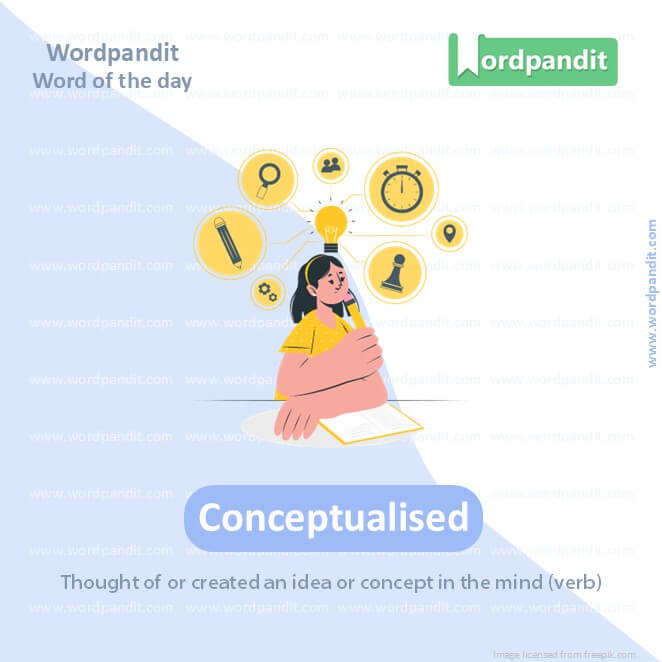
WORD-3: Conceptualised
Context: The celebration of women’s day in the Secretariat is a case in point. Women’s day programmes are conceptualised, organised and executed by women officers or employees.
Source: The Hindu
Explanatory Paragraph: Imagine you have a cool idea in your head, like building a super fun treehouse. When you think of the idea clearly and start making a plan, that’s called “conceptualising.” It’s like turning your idea into something real in your mind first, before it happens.
Meaning: Thought of or created an idea or concept in the mind (verb).
Pronunciation: kon-SEP-choo-uh-lized
Synonyms: envisioned, imagined, formulated, ideated, designed, planned
Usage Examples:
1. The artist conceptualised a beautiful painting before picking up the brush.
2. They conceptualised the project as a way to help the environment.
3. The new product was first conceptualised by the company’s research team.
4. She conceptualised a plan for the party that included games and decorations.
WORD-4: Dehumanisation
Context: Israel talks of Hamas-run schools and Hamas-run hospitals to continue the dehumanisation of Palestinians and to set the stage for more crimes.
Source: The New York Times
Explanatory Paragraph: Imagine if someone forgot that other people have feelings and emotions, and they started treating them like robots or things. That’s what “dehumanisation” means. It’s when people are treated like they’re not real human beings.
Meaning: The process of taking away human qualities, like kindness or compassion, from a person or group (noun).
Pronunciation: dee-hyoo-muh-nye-ZAY-shun
Synonyms: degradation, demonization, objectification, vilification, marginalization
Usage Examples:
1. The soldiers were affected by the dehumanisation they experienced during the war.
2. Dehumanisation can lead to people treating others cruelly, forgetting their humanity.
3. The movie highlighted the dehumanisation of workers in factories.
4. History shows many examples of how dehumanisation can lead to terrible actions.
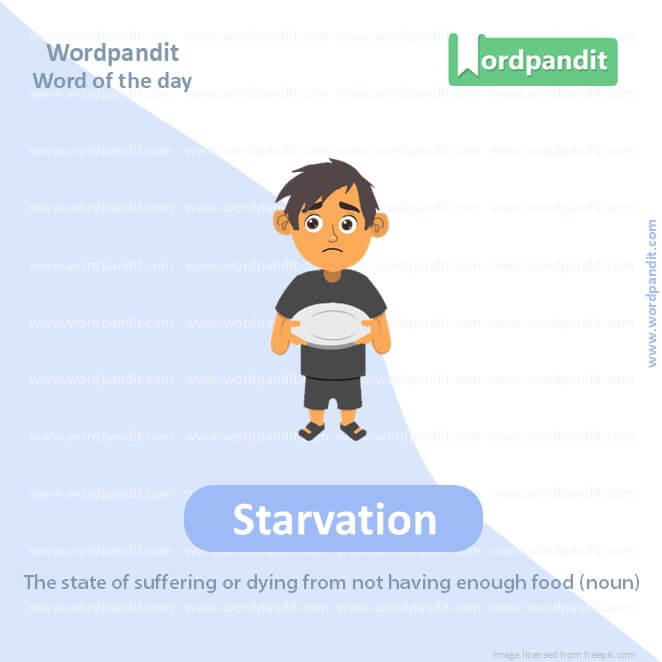
WORD-5: Starvation
Context: Israel has also put the Strip under a total siege, preventing the entry of water, food, fuel, electricity or medical supplies, and leaving more than two million people faced with death by starvation, dehydration, and disease.
Source: Al Jazeera
Explanatory Paragraph: Starvation is like when you are super, super hungry, but no matter how hungry you get, there is no food to eat. If this goes on for too long, it can make you very sick. Starvation happens when people don’t have enough food for a long time.
Meaning: The state of suffering or dying from not having enough food (noun).
Pronunciation: star-VAY-shun
Synonyms: famine, malnutrition, hunger, deprivation, famishment, food shortage
Usage Examples:
1. Many people in the region were suffering from starvation due to drought.
2. The animals in the wild sometimes face starvation when food is scarce.
3. The organization helps to fight starvation in countries affected by war.
4. Starvation can lead to serious health problems and even death if not addressed.
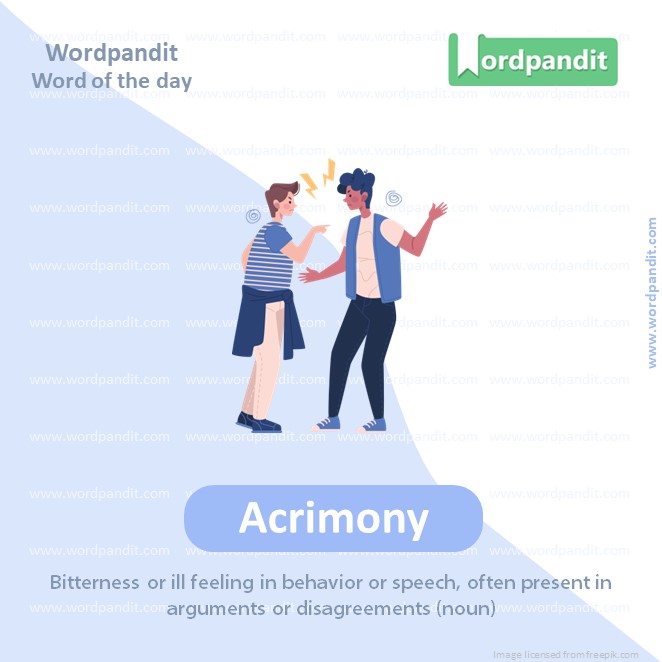
WORD-6: Acrimony
CONTEXT: These trends need to be reconciled in a manner that helps the progress of the country, rather than becoming a source of acrimony.
SOURCE: The Hindu
Explanatory Paragraph: Acrimony is like when you and your friend are really mad at each other and say mean things. It’s a strong feeling of anger, bitterness, or dislike between people, especially when they argue or don’t get along.
Meaning: Bitterness or ill feeling in behavior or speech, often present in arguments or disagreements (noun).
Pronunciation: AK-ri-moh-nee
Synonyms: Bitterness, Resentment, Animosity, Hostility, Ill will, Rancor.
Usage Examples:
1. The discussion ended in acrimony, with both sides angry at each other.
2. There was a sense of acrimony in the room after the heated debate.
3. His acrimonious remarks made the conversation uncomfortable.
4. The divorce was filled with acrimony and disagreements.
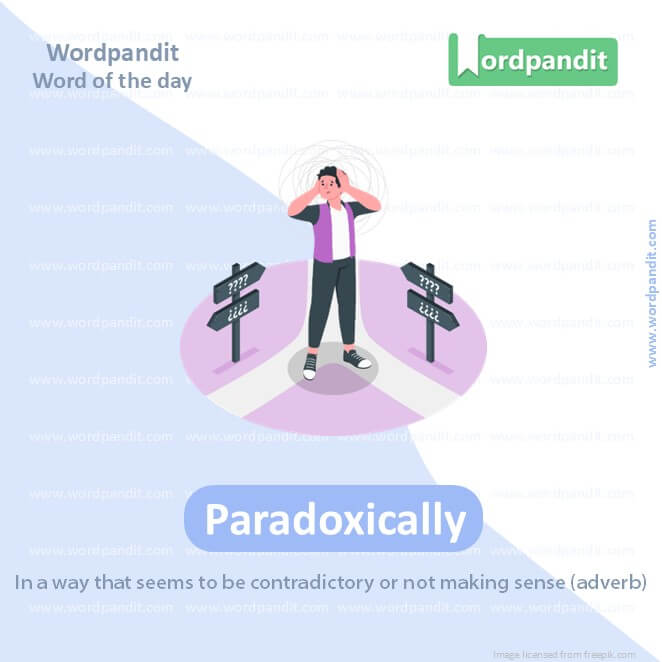
WORD-7: Paradoxically
Context: Paradoxically, it exposes an unwillingness to take terrorists seriously, reducing them to “crazy” or “irrational” adversaries. They usually aren’t.
Source: The Guardian
Explanatory Paragraph: Imagine a situation where you say you love ice cream, but you never eat it! That’s kind of “paradoxical.” It means something that seems like it doesn’t make sense because two things that are opposite are happening at the same time.
Meaning: In a way that seems to be contradictory or not making sense (adverb).
Pronunciation: pair-uh-DOK-sih-klee
Synonyms: contradictorily, inconsistently, illogically, absurdly, surprisingly
Usage Examples:
1. Paradoxically, the more he tried to help, the worse things became.
2. It is paradoxically true that you must spend money to make money.
3. Paradoxically, the fastest runner didn’t win the race.
4. The situation was paradoxically both funny and sad at the same time.
WORD 8: Consolidation
CONTEXT: Nation makers grappled with these challenges of imbalances and diversity, to set in motion the consolidation of the most diverse, and most populated democratic country on the planet.
SOURCE: The hindu
Explanatory Paragraph: Think about when you clean your room and put all your toys in one box instead of having them all over the place. Consolidation is like that. It’s when you bring things together to make them more organized or stronger. Like combining small piles of blocks into one big pile.
Meaning: The act of combining multiple elements into a single, more effective or coherent structure (noun).
Pronunciation: con-soh-li-DAY-shun
Synonyms: Merger, Unification, Integration, Amalgamation, Fusion, Centralization.
Usage Examples:
1. The consolidation of the two companies created a more powerful business.
2. By consolidation, the small farms became a single large one.
3. The consolidation of her ideas into one theory helped her write a better research paper.
4. The school’s consolidation of resources led to better educational tools for students.
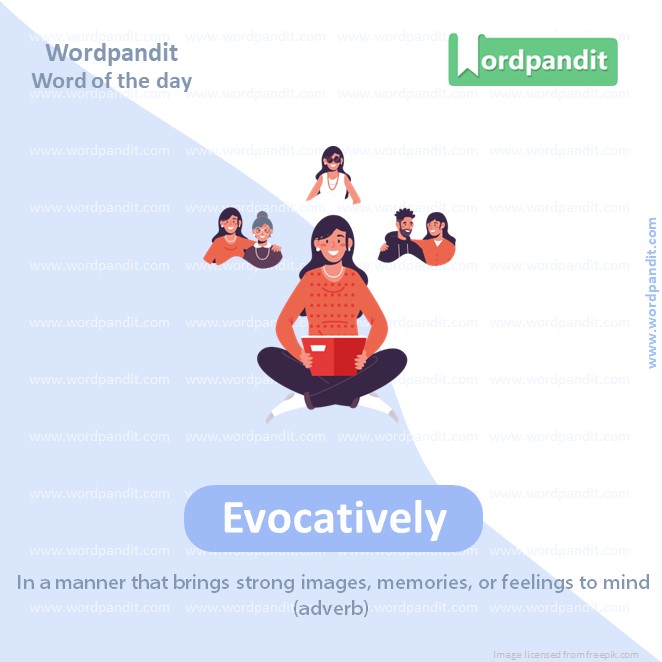
WORD 9: Evocatively
CONTEXT: Few barometers measure the climate crisis as evocatively as the state of glaciers, a key component of the cryosphere.
SOURCE: The Hindu
Explanatory Paragraph: When something is evocative, it’s like when you smell cookies baking and it makes you think of baking with your grandma. Evocatively means causing you to have a strong feeling or memory about something, often something nice or interesting.
Meaning: In a manner that brings strong images, memories, or feelings to mind (adverb).
Pronunciation: ee-VOH-kuh-tiv-lee
Synonyms: Suggestively, Reminiscently, Vividly, Impressively, Poignantly, Stirringly.
Usage Examples:
1. The old photographs spoke evocatively of a time long past.
2. The music was evocatively reminiscent of her childhood.
3. She described the scene evocatively, making everyone feel as if they were there.
4. The author writes evocatively, drawing the reader into the story.
WORD-10: Conspiratorial
Context: Her economic plans are sprinkled with conspiratorial references to foreign monopolies.
Source: The New York Times
Explanatory Paragraph: Imagine if a group of friends are whispering together, making secret plans. They are acting in a “conspiratorial” way. It means acting like you’re part of a secret group planning something, usually something sneaky.
Meaning: Acting or suggesting involvement in a secret plan, often in a sneaky or suspicious way (adjective).
Pronunciation: kun-SPEER-uh-tore-ee-uhl
Synonyms: secretive, scheming, plotting, colluding, clandestine, sneaky
Usage Examples:
1. They exchanged conspiratorial glances during the meeting.
2. The conspiratorial group met in secret to plan their next move.
3. His conspiratorial whisper made everyone curious about what he was hiding.
4. The plot had a conspiratorial tone, with characters always hiding something.













